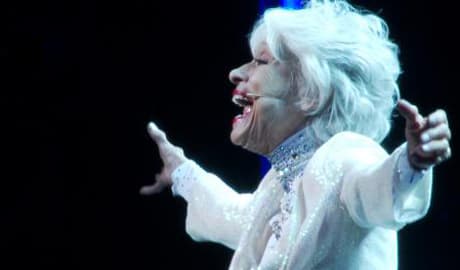I was going to observe that the 90-year-old Carol Channing has a little trouble hitting high notes while rehearsing for her first Broadway appearance in over a decade in Carol Channing: Larger Than Life, but musical precision was never key to her appeal. Tall, platinum blonde, with fire truck lipstick and a cheese-grader voice, the grand dame of Broadway has always seemed like a parody of showbiz glamour.
She has been performing since 1941, with a punishing schedule that has included thousands of stage performances and countless talk show appearances, and her over-the-top persona has so rarely faded that it's hard to tell if there's any line between Carol Channing and "Carol Channing."
Director Dori Berenstein takes Channing at face value, which makes for pleasant but superficial viewing, and Carol Channing: Larger Than Life gives the impression of having been made by too much of a fan. There are only two brief mentions of her troubled 42-year marriage with manager Charles Lowe, and less than 30 seconds are devoted to her bout with ovarian cancer. We learn nothing about what drove her legendary professionalism (she missed only one of her 5,000-plus scheduled performances of Hello, Dolly) except, apparently, that she was legendarily professional.
Plenty of her fans and colleagues are interviewed (including Bruce Vilanch, Loni Anderson, Phyllis Diller and Rich Little, who, I swear to god, actually trots out his George Burns impression), but their insights are more fan-ish than analytical. Berenstein is too reluctant to venture into any darker territory.
The film follows Channing's life roughly chronologically, emphasizing her success with Hello, Dolly! and her belated marriage to middle-school sweetheart Harry Kullijian, but with the framing device of Channing rehearsing for her Broadway appearance used in such a half-baked way, it still feels formless.
It would have been nice to see more footage from Channing in her prime, instead of relying so heavily on the rather simplistic testimonials (there are clips of her Broadway shows and talk show appearances, but none last long enough to convey her talents). We do, however, see plenty of her in modern-day interview segments, and she is very agreeable company. With her blonde hair turned platinum white, and her lipstick now bright pink, she somehow seems more like Carol Channing than ever.
If the idea of a Carol Channing documentary appeals to you, you'll find more to like in this feature-length valentine. I'm pretty indifferent, but I have to admit, it's hard to watch this without feeling affectionate towards the old gal. And, truth be told, I did get goose bumps watching her belt out "Hello, Dolly" one more time at the end.
(Dramatic Forces)She has been performing since 1941, with a punishing schedule that has included thousands of stage performances and countless talk show appearances, and her over-the-top persona has so rarely faded that it's hard to tell if there's any line between Carol Channing and "Carol Channing."
Director Dori Berenstein takes Channing at face value, which makes for pleasant but superficial viewing, and Carol Channing: Larger Than Life gives the impression of having been made by too much of a fan. There are only two brief mentions of her troubled 42-year marriage with manager Charles Lowe, and less than 30 seconds are devoted to her bout with ovarian cancer. We learn nothing about what drove her legendary professionalism (she missed only one of her 5,000-plus scheduled performances of Hello, Dolly) except, apparently, that she was legendarily professional.
Plenty of her fans and colleagues are interviewed (including Bruce Vilanch, Loni Anderson, Phyllis Diller and Rich Little, who, I swear to god, actually trots out his George Burns impression), but their insights are more fan-ish than analytical. Berenstein is too reluctant to venture into any darker territory.
The film follows Channing's life roughly chronologically, emphasizing her success with Hello, Dolly! and her belated marriage to middle-school sweetheart Harry Kullijian, but with the framing device of Channing rehearsing for her Broadway appearance used in such a half-baked way, it still feels formless.
It would have been nice to see more footage from Channing in her prime, instead of relying so heavily on the rather simplistic testimonials (there are clips of her Broadway shows and talk show appearances, but none last long enough to convey her talents). We do, however, see plenty of her in modern-day interview segments, and she is very agreeable company. With her blonde hair turned platinum white, and her lipstick now bright pink, she somehow seems more like Carol Channing than ever.
If the idea of a Carol Channing documentary appeals to you, you'll find more to like in this feature-length valentine. I'm pretty indifferent, but I have to admit, it's hard to watch this without feeling affectionate towards the old gal. And, truth be told, I did get goose bumps watching her belt out "Hello, Dolly" one more time at the end.
